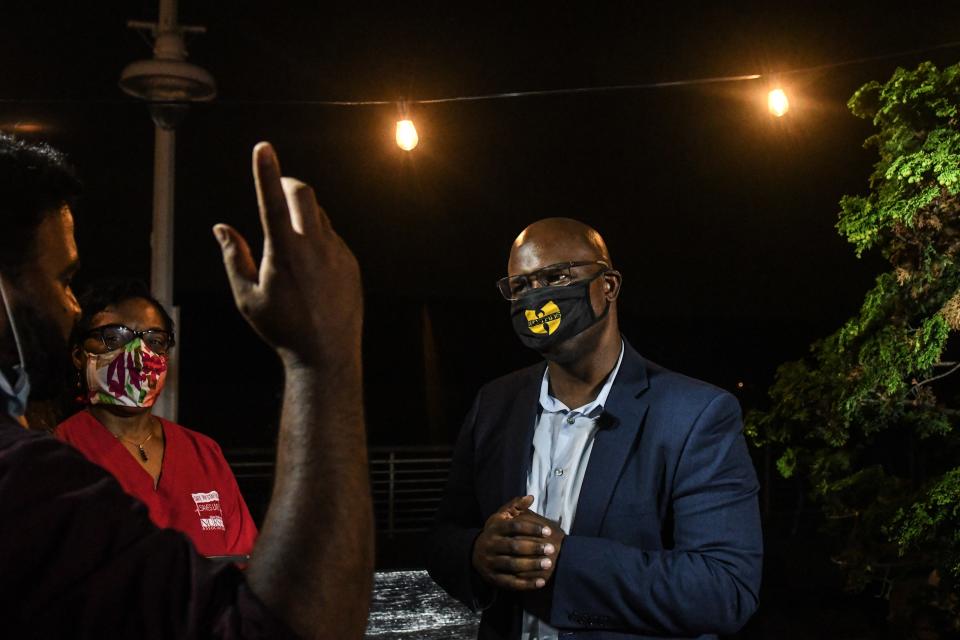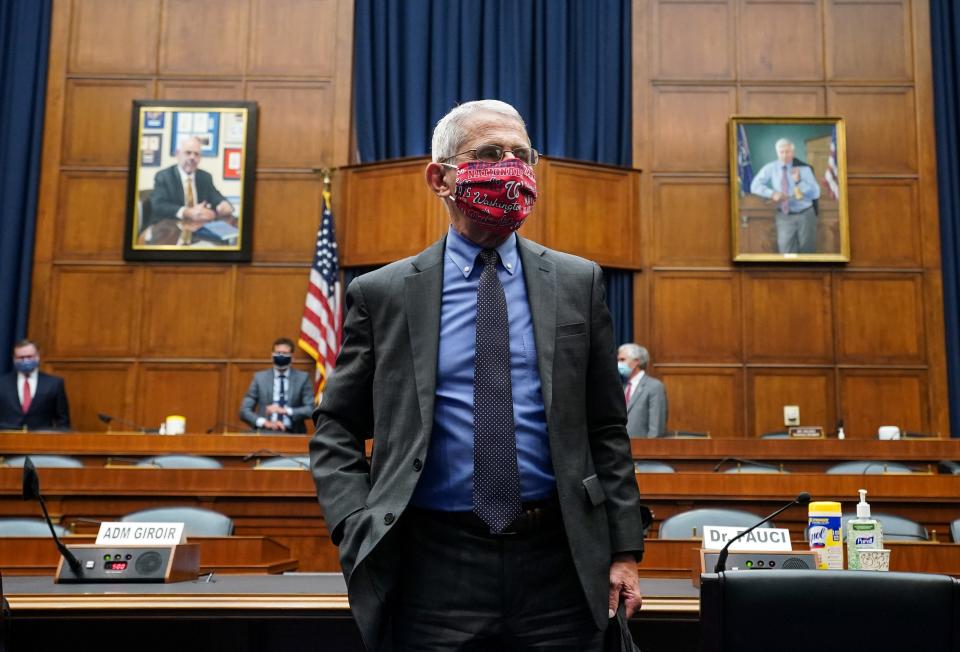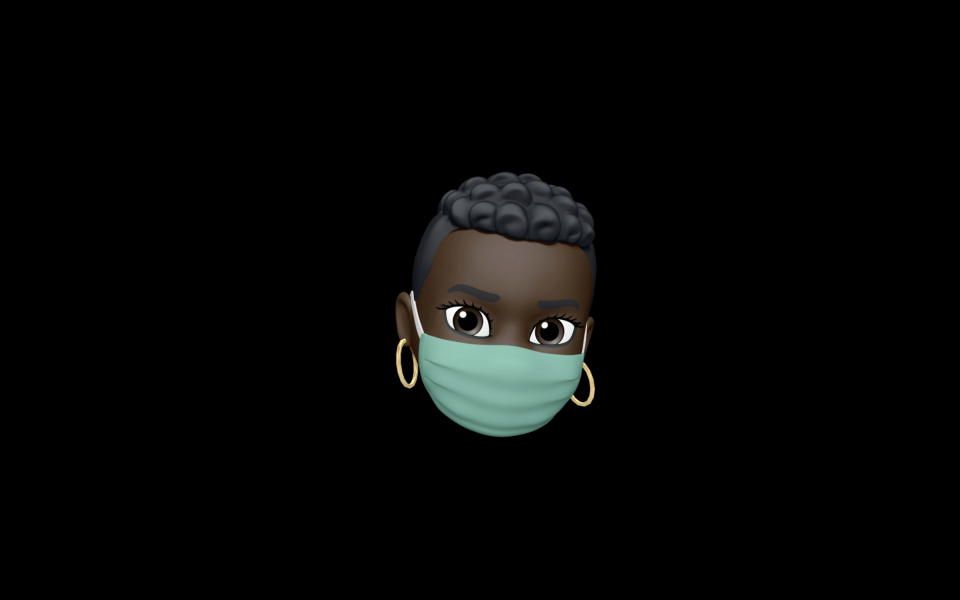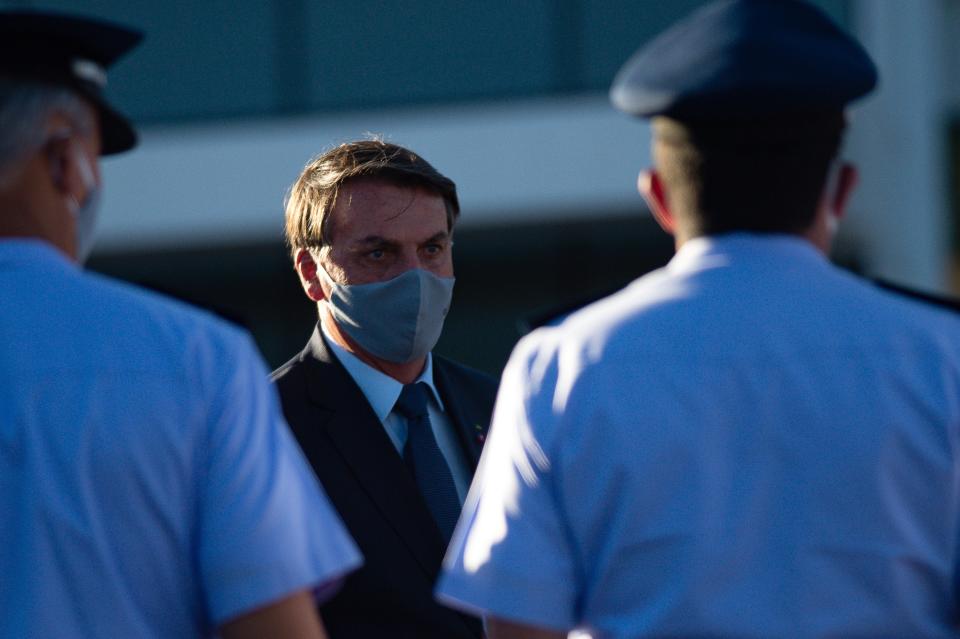How Savvy Leaders Are Using Masks to Send a Message
Last night, giving his victory speech at an election night event, New York Democratic congressional primary winner Jamaal Bowman looked every bit the part of the progressive. He stood behind the podium in a sharp navy blue suit worn with a light blue button-up. There wasn’t a tie in sight and the top button on Bowman’s shirt was undone. This was a man ready to do some work, the outfit said. But the most vibrant sartorial symbol of the night came when Bowman stepped down from the podium to meet with his supporters and covered his face with a mask printed with the Wu-Tang Clan’s “W” emblem. Certainly one way to protect ya neck.

In the span of a few months, the mask has become the most divisive piece of clothing of our times. 70% of Democrats report regularly wearing a mask versus only 37% of Republicans, according to a Kaiser Family Foundation survey. Members of congress have begged President Trump to wear one. “IT'S NOT ALL ABOUT YOU, @realDonaldTrump,” Eric Swalwell, a California representative wrote on Twitter. “Get over yourself, at least pretend to be a leader, try to save some American lives, and wear the damn mask.” Only 48% of Republicans agree Donald Trump should follow Swalwell’s instructions, according to the KFF survey. This year, politicians relying on clothes to do the work for them have mostly found that strategy to be completely ineffectual. But smart politicians like Bowman or experts like Dr. Anthony Fauci are showing the many ways a mask can be deployed in their favor. Elsewhere, figures like Trump and Brazilian president Jair Bolsonaro are feeling the heat for not using a face mask.
Wearing any mask is already a political statement: one that implies care for others. (It also immediately positions the wearer as a counterpoint to history’s greatest ultracrepidarian in Trump.) But more than that, Bowman used his mask to express more than he would have been able to without it. Wearing Wu-Tang Clan merch in the form of a T-shirt or hoodie would have been, let’s say, out of step with the traditional politician’s wardrobe. With a mask, Bowman is able to don a suit as well as express his love for legendary ‘90s hip-hop crews—in the process separating himself from stodgy incumbent opposition Eliot Engel, most often seen wearing a plain blue surgical mask or white KN95. .
In the right hands, or, err, on the right face, the mask can carry a potent political message. But that doesn’t mean it always has to be as obvious as Hillary Clinton’s “VOTE” mask. Yesterday, while testifying in front of Congress as part of the Coronavirus Task Force, Dr. Anthony Fauci changed from a plain black mask to one emblazoned with the Washington Nationals logo. The idea was to introduce a bit of levity during a round of hearings that touched on surging cases and Trump’s suggestion that the U.S. slow down testing. “I'm an avid Washington Nationals fan so I thought I would break up this a little bit by putting on my Washington Nationals face mask,” Fauci said.

That the face mask has evolved into such a tool of personal expression speaks to the way the item is settling into our lives. Even in the early days of masked existence, brands and consumers found ways to turn the medical essential into another piece of personal style. Fauci testified yesterday that, “optimistically,” he sees a vaccine for coronavirus emerging late this year or early next. Which means that masks are here for the foreseeable future—and Bowman, Fauci, Pelosi and others are doing what they can to normalize wearing them. Even Apple, during its developer’s conference yesterday, introduced a face mask-wearing Memoji.

The outcry surrounding Trump’s refusal to wear a mask largely rests on the fact that he’s modeling poor behavior for his followers. That sentiment carries over to other countries trying to tamp down the same virus—and the same breed of flagrant behavior. Yesterday, a federal judge in Brazil ruled that Bolsonaro, a close Trump ally, is required to wear a mask. The judgement follows concern that Bolsonaro’s behavior was making it harder to get the rest of the country onboard with facial coverings. “With the example of the president of Brazil, everything is more difficult for us," Joao Doria, Sao Paulo’s governor, told CNN last month. "He goes to the streets without masks. A wrong behavior and wrong indication. This is very sad for Brazil and makes everything more difficult for the governors in the states of Brazil.”

It all comes down to a problem of perception. Bolsonaro and Trump see wearing a mask as evidence of weakness; Bowman and others have smartly identified the mask as a potential strength, a canvas to carry an idea or preference that might resonate with a potential supporter. In the age of social distancing and a recommended six feet of space between everyone, politicians like Bowman are smart not to turn their noses up at an accessory that might close the distance between them and voters.
Originally Appeared on GQ

